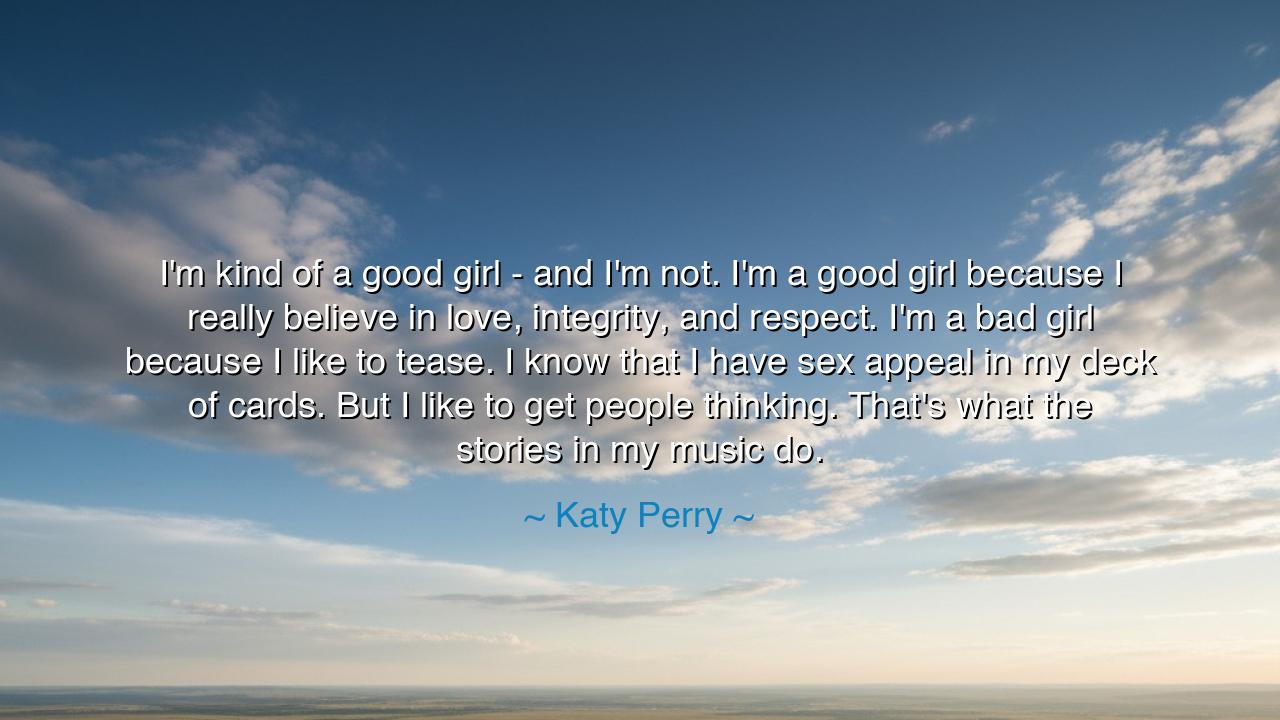
I'm kind of a good girl - and I'm not. I'm a good girl because I
I'm kind of a good girl - and I'm not. I'm a good girl because I really believe in love, integrity, and respect. I'm a bad girl because I like to tease. I know that I have sex appeal in my deck of cards. But I like to get people thinking. That's what the stories in my music do.






Katy Perry, daughter of fire and song, once spoke with honesty and paradox, revealing the duality of the human spirit: “I'm kind of a good girl – and I'm not. I'm a good girl because I really believe in love, integrity, and respect. I'm a bad girl because I like to tease. I know that I have sex appeal in my deck of cards. But I like to get people thinking. That's what the stories in my music do.” In her words shines an ancient truth: that humanity is never one thing, but a weaving together of virtue and play, seriousness and joy, the sacred and the sensual.
The good girl, she says, is grounded in love, integrity, and respect. These are the eternal virtues praised by sages and prophets. Love is the flame that warms the world, integrity is the rock upon which trust is built, and respect is the foundation of peace among peoples. To live by these values is to walk in the way of light, to be the kind of person whose soul inspires honor and whose presence uplifts others. In this, Katy Perry aligns herself with the lineage of the noble-hearted, those who know that goodness is not weakness but the greatest of strengths.
Yet she does not deny the other side: the bad girl, who delights in teasing, who embraces her own sex appeal, and who wields it not as a weapon of destruction but as a tool of provocation, to stir thought and awaken conversation. This is not wickedness but a recognition that playfulness, allure, and challenge are part of the human condition. The ancients, too, revered this balance—think of Aphrodite, goddess of love and beauty, who inspired both delight and danger, or the poet Sappho, whose verses blended tenderness with fire. In such figures we see that humanity’s fullness cannot be captured by purity alone, but must include passion and daring.
To tease, to provoke, to awaken thought—this too is art. In her music, Perry takes on the role of the trickster, the one who unsettles the comfortable, who sparks reflection in the hearts of listeners. This archetype appears in every culture: Loki in Norse myth, Hermes in Greek tradition, the Coyote among Native peoples. They remind humanity that laughter, challenge, and even mischief can be tools of wisdom. In this sense, Perry is not merely singer but storyteller, drawing upon this ancient lineage to inspire questions about love, identity, and desire.
History itself has known many who carried such a dual flame. Consider Cleopatra, queen of Egypt. She was both revered for her intellect, her diplomacy, and her devotion to her people, and infamous for her allure, her cunning, and her unapologetic embrace of power through beauty. She was “good” in her commitment to her nation, “bad” in the eyes of those who feared her, yet wholly herself. Through her life, as through Perry’s words, we see that embracing complexity can be a form of strength, not contradiction.
O children of tomorrow, learn this well: the human spirit is not made to fit into a single box. To deny the playful is to crush the spark of joy; to deny the virtuous is to wander into ruin. The art of life is to hold both in harmony—to let love, integrity, and respect guide the soul, while allowing playfulness, allure, and provocation to awaken minds and bring laughter to the world.
The lesson is clear: do not fear your complexity. Be honest about your virtues, and be unashamed of your fire. Live with integrity, but do not lose the joy of teasing and the courage of expression. In your relationships, honor others with respect; in your creativity, dare to provoke thought. For in this balance lies wholeness, and in wholeness lies the power to move hearts and inspire change.
Thus let Katy Perry’s words be remembered as both confession and teaching: we are at once good and bad, light and playful, serious and mischievous. To embrace all of these is not to be divided, but to be fully human. And when we live this truth with courage, our lives—like her music—will both uplift and challenge, both comfort and inspire, leaving behind stories that endure beyond our days.






AAdministratorAdministrator
Welcome, honored guests. Please leave a comment, we will respond soon